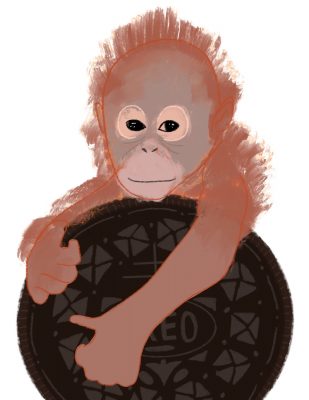Gatot was orphaned, abandoned and crying when a villager in Indonesia found him. The man brought the frightened young orangutan home illegally and cared for him as someone would a human baby.

When the International Animal Rescue team heard Gatot was being kept as a pet, they headed to the village of Jelai Hulu to begin his rehabilitation process. After all, Gatot would have a lot to learn about being an orangutan to survive in the wild.
Any motherless primate is put at an immediate disadvantage, but orangutans specifically spend between seven to eight years by their mother’s side — longer than any other wild primate. They learn the ways of the jungle by watching and copying her, so they can eventually navigate the jungle on their own.
Gatot, on the other hand, spent the first two months of his life drinking condensed milk inside the home of a Jelai Hulu villager. He had no one to teach him how to find food, swing from trees or interact with other orangutans.
If he weren’t rescued, Gatot would have grown too large to take care of safely and would have been unethically caged by his owners or sent away to a center much too late for a successful rehabilitation.

After all, how does a near-adult orangutan spoiled with human luxuries ever adjust to a forest lifestyle?
My friend, having known my love of orangutans, adopted Gatot on my behalf for my birthday. I get regular updates that tell me about his progress.
Despite his unfortunate start to life, four years after being brought to the Orangutan Rescue Centre in Sungai Awan, Gatot has made excellent progress on many necessary skills. He makes nests, forges for fruit and socializes with the other orangutans.
While he is on track for an eventual release into the wild, none of the staff at the sanctuary can make up for the life lessons he should have learned from his mother.
So, what happened to her?
Although no one can say for certain what fate Gatot’s mother met, the threat of orangutan extinction is, for the most part, a result of palm oil production. Palm oil is a major ingredient in a number of everyday products but it has major consequences on Indonesian wildlife.
Indonesia is the largest producer of palm oil, and one of its islands — Sumatra — has plantations that add up to the size of Switzerland. That means thousands upon thousands of orangutans are left displaced, hungry, orphaned and sold on the black market as pets.
Upon finding out palm oil is responsible for so much death and trauma within the decreasing orangutan population, I knew I wanted to do something about it. Palm oil is a common ingredient in many American name-brand products, so all I had to do was avoid those products. How hard could it be?
Palm oil has a variety of purposes and is commonly found in — including but by no means limited to — bread, chocolate, deodorant, biodiesel, soap, shampoo, detergent, toothpaste, lipstick and cookies.
I turned over the box of Oreo cookies I had been eating in horror. I skimmed the ingredients list: unbleached enriched flour, sugar … and palm oil.
The worst part is there is no way of guaranteeing mass-produced products, such as untraceable palm oil, are cruelty free. So, when it comes to the ingredient, we never really know what we’re getting.
Adjusting takes time, and being an ethical consumer doesn’t mean immediately giving up Oreos, laundry and showering. It does mean being mindful as you transition to cruelty-free products.
In the case of palm oil, I’ll be slowly opting for products certified by the Roundtable of Sustainable Palm Oil instead of my current, unsustainable alternatives. Simply put, next time I go to the grocery store, I’ll buy one pack of Oreos instead of my usual two.
Palm oil production is more than just an orangutan nightmare — it’s a modern day reality we take advantage of every day. We’ve replaced ethics with convenience, and wildlife shouldn’t have to keep paying the price.
























































































































Gary Shapiro • Jan 26, 2021 at 2:23 pm
Well done, Ally. Taking positive consumer action to reduce your impact on orangutans, biodiversity and the environment is key. Thanks for educating others about this. Groups like the Orang Utan Republik Foundation are also educating people about this issue. More can be found at http://www.orangutanrepublik.org.